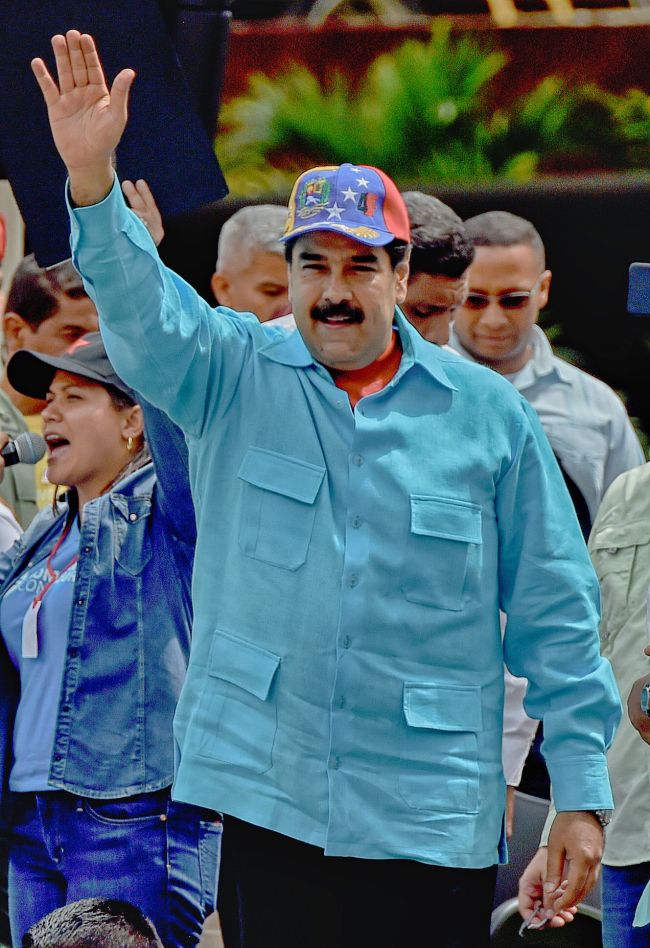Venezuelan President Nicolas Maduro announced a sweeping crackdown Saturday under a new emergency decree, ordering the seizure of paralyzed factories, the arrest of their owners and military exercises to counter alleged foreign threats.
The embattled leftist is struggling to contain a raging economic crisis that has led to food shortages, soaring prices, riots, looting and vigilante justice, pushing Venezuela to the brink of collapse.
He accused the United States on Friday of destabilizing the country at the behest of the “fascist Venezuelan right,” prompting him to declare a state of emergency.
 |
Venezuelan President Nicolas Maduro. AFP-Yonhap |
Addressing his supporters at a rally in central Caracas on Saturday, Maduro announced some of the actions to be taken under the decree, which has not yet been published.
“We must take all measures to recover productive capacity, which is being paralyzed by the bourgeoisie,” he told the cheering, red-clad crowd.
“Anyone who wants to halt (production) to sabotage the country should get out, and those who do must be handcuffed and sent to the PGV (Venezuelan General Penitentiary).”
The move comes after the largest food and beverage company in Venezuela, the Polar Group, halted production of beer on April 30, saying government mismanagement meant it was no longer able to import barley.
The company’s owner, billionaire businessman Lorenzo Mendoza, is a vocal opponent of Maduro, and the president has accused him of conspiring against his government.
Maduro also ordered military exercises next Saturday “to prepare ourselves for any scenario,” denouncing alleged plans for an “armed intervention.”
Opposition leaders accused Maduro of using the emergency decree to destabilize the country and block them from organizing a referendum on removing him from office.
The opposition has launched the process by collecting 1.8 million signatures in favor of a recall vote, but say authorities are now stalling.
At a rival rally on the east side of the capital, opposition leader Henrique Capriles warned Maduro was pursuing a dangerous strategy.
“Venezuela is a bomb that could explode any minute,” he told some 1,000 protesters decked out in the red, yellow and blue of the Venezuelan flag.
“If you block the democratic path, we don’t know what could happen.”
Venezuela has the world’s largest oil reserves, but is mired in a crippling recession exacerbated by an electricity crisis that has forced the government to decree daily power cuts across most of the country, close schools on Fridays and reduce the workweek to two days for government employees.
Maduro’s decree expanded an “economic emergency” declared in January to a full-blown state of emergency.
The extent of the decree was unclear, but political analysts said it could be used to limit the right to protest, authorize preventive arrests and allow police raids without a warrant.
Maduro said the measures, which initially apply for three months, will likely be extended through 2017.
Maduro regularly blames U.S. and local business interests for what his administration calls an “economic war” on oil-dependent Venezuela, whose economy has sunk in tandem with global crude prices.
Venezuela‘s economy contracted 5.7 percent last year and its official inflation rate topped 180 percent.
Washington has had a rocky relationship with Caracas since Maduro’s late predecessor and mentor, Hugo Chavez, came to power in 1999.
Senior US intelligence officials believe Maduro’s government could be overthrown in a popular uprising this year, The Washington Post reported Saturday.
“You can hear the ice cracking,” an intelligence official said. “You know there’s a crisis coming.”
Maduro said Friday that a plot against his government was being “activated in Washington, requested and pushed by elements of the fascist Venezuelan right, emboldened by the coup d’etat in Brazil” -- a reference to the impeachment trial opened Thursday in Brasilia against suspended leftist president Dilma Rousseff.
The opposition is racing to hold a recall referendum before the end of the year, when a successful recall vote would trigger new elections. Under the constitution, after January 10 -- four years into Maduro’s six-year term -- the socialist president would simply be replaced by his vice president.
Riot police this week fired tear gas to stop protesters from marching to the headquarters of the National Electoral Board.
The opposition says Maduro controls the CNE and the Supreme Court, which has issued a series of rulings hamstringing the power of the Venezuelan National Assembly since the opposition won control of it in legislative elections in December.
The spiraling tension has raised fears of a return to the protest violence that killed 43 people in Venezuela in 2014. (AFP)








